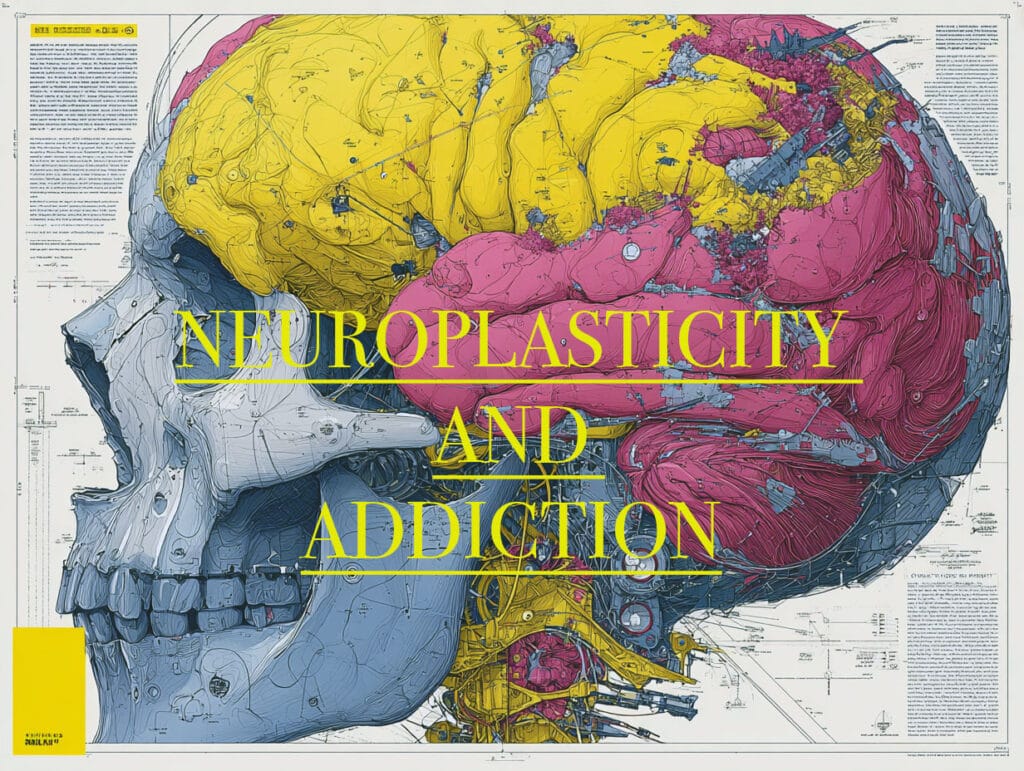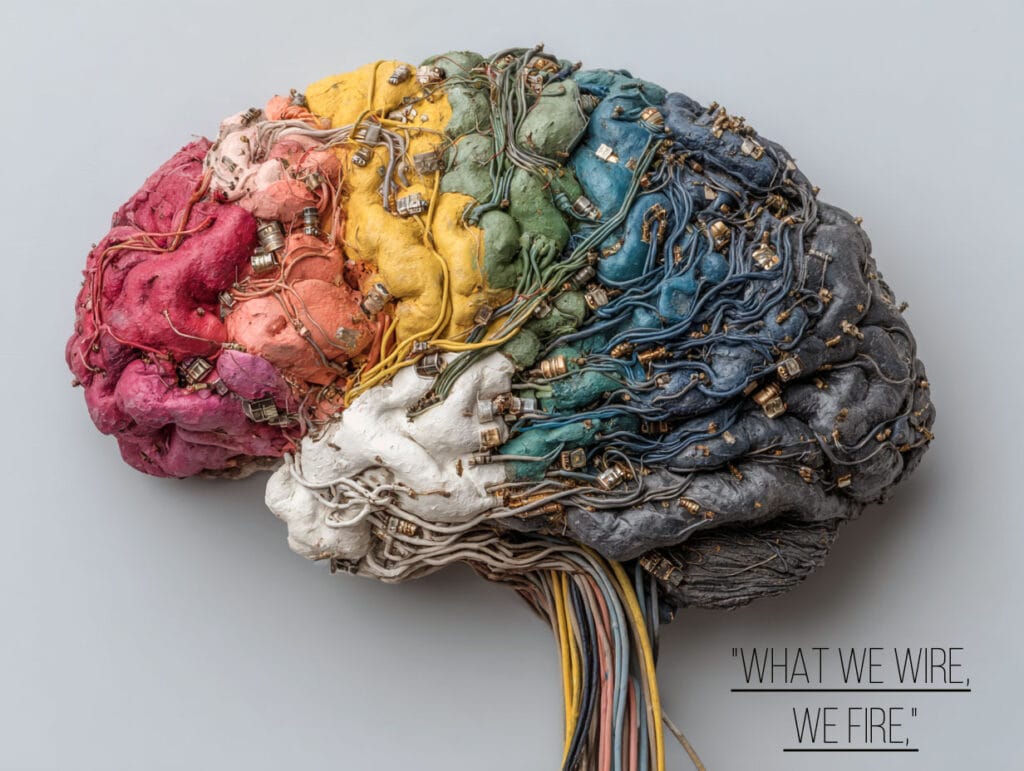
Neuroplasticity and Addiction: How to Rewire Your Brain and Break Free From Booze
Addiction Isn’t a Choice, It’s Wiring
Neuroplasticity and Addiction. Most people think addiction is weakness. They think you can’t control yourself, that you need more willpower, or that you’re broken. That’s bollocks. Addiction isn’t about character flaws; it’s about brain wiring.
Every pint, every binge, every time you reached for booze to cope… your brain was laying down neural pathways—cue, craving, reward. Over the years and decades, those pathways turn into motorways. Automatic. That’s why you can find yourself reaching for a drink before you even realise you’ve walked to the fridge.
The good news? Those pathways aren’t permanent. Your brain is plastic, not stone. That’s where neuroplasticity and addiction meet. Your brain can rewire itself. And if you’re trying to quit drinking, break free from addiction, or escape destructive patterns, neuroplasticity is your way out.
This isn’t theory. It’s what I live. I spent over 40 years drinking, trained my brain into chaos, and then rewired it sober. These are the tools I used and still use today: cold water, breathwork, meditation, food, fasting, and movement.
What is Neuroplasticity?
Neuroplasticity means your brain can change. It’s the ability to form new neural connections, strengthen them through repetition, and weaken the old, destructive ones you want to leave behind.
When you drink, your brain adapts. Dopamine surges from alcohol light up your reward system. Your brain learns: booze equals relief. But it doesn’t care that it ruins your health, your relationships, and your life. It just reinforces the cycle.
When you stop drinking, the wiring doesn’t vanish overnight. The old circuits are still there, which is why cravings and lapses hit so hard. But neuroplasticity lets you carve out new pathways. Each sober choice weakens the old wiring and strengthens the new.
Think of it like footpaths. The old one is a motorway, smooth and wide. The new one is a narrow dirt track. But the more you walk the new path, the stronger it gets. Eventually, it becomes the road your brain defaults to.
Why Willpower Alone Doesn’t Work
“Just stop.” If it were that simple, nobody would struggle. Willpower is trying to fight four decades of wiring with sheer stubbornness. It burns out fast.
Neuroplasticity shows why consistency beats willpower. Each action, choosing a walk over a pint, meditating through a craving, taking a cold shower instead of cracking a can, rewires your brain. Not instantly. Not perfectly. But over time, repetition does what brute force never could.
The Tools I Use to Rewire My Brain
1. Cold Water Therapy
Bob, my addictive voice, screams every time I walk towards the river: “Don’t do it, it’s freezing, you’ll die.” I go in anyway. That’s neuroplasticity in action.
Cold water shocks your system. It forces you into presence. More importantly, it trains your nervous system to regulate stress without alcohol. Every time I step into that river, I reinforce a new pathway: stress doesn’t mean drink, stress means reset.
2. Meditation and Visualisation
I sit in silence and picture the sober, lighter, healthier version of me. My brain starts building that image into a blueprint. Neuroplasticity thrives on repetition. The more I visualise my future self, the more my brain treats it as real.
Meditation also calms the constant chatter. It gives you the space between urge and action, and in that space, rewiring happens.
3. Breathwork
When cravings hit, I don’t fight them head-on. I breathe through them. Slow, controlled, deliberate. Breathwork shifts my nervous system out of panic mode and teaches my body a new stress response.
This is about ownership. Not a fad. Not a trend. My own daily breathwork practice. When I choose breath over booze, I wire that choice into my brain.
4. Movement
Even with my back injury, I move every day. Stretching, walking, dipping in the river. Addiction thrives in stillness and stagnation. Neuroplasticity thrives in action.
You don’t need a gym. You need to move. Movement reinforces the message that you’re building a new life, not trapped in the old one.
5. Food and Fasting
Most people ignore this. The gut and brain are one system, the gut-brain axis. What you eat affects how you think and feel.
Alcohol wrecks your gut, floods it with inflammation, and cuts off serotonin production. Clean food, fermented kraut, bone broth, fasting, these aren’t trendy hacks; they’re fuel for brain rewiring. My clarity skyrocketed once I sorted my diet.
6. Consistency
This is the hardest truth. Neuroplasticity doesn’t care about one-off wins. It cares about repetition. That’s how the old wiring got so strong, and it’s how the new wiring will take over.
Every day you pick up the tools, breath, cold, food, meditation, movement, you carve deeper tracks into your brain.

The Science: How Long Does Rewiring Take?
People always ask, “How long until I feel different?”
The answer: longer than you want, shorter than you fear.
- Within weeks, you’ll feel shifts, better sleep, clearer mornings, and sharper focus.
- Within months, new habits feel more natural, cravings weaken, and energy rises.
- Within years, the old wiring fades into the background.
Neuroplasticity is lifelong. You’re always rewiring. The question is whether you’re reinforcing destructive pathways or building new ones.
FAQs on Neuroplasticity and Addiction
Q: Does neuroplasticity work for all addictions?
Yes. Booze, drugs, porn, gambling, food, doom scrolling, all of it. Same brain, same wiring, same tools to rewire.
Q: What if I relapse?
Call it a lapse, not the end. The old wiring is still there. Step back onto the new path. Every choice still counts.
Q: Do I need rehab to rewire my brain?
No. Rehab helps some people, but you can rewire at home. I did it. Tools like meditation, cold water, and fasting are free and accessible.
Q: Isn’t it too late for me?
No. Neuroplasticity doesn’t stop at 20, 30, or 50. I quit after 40 years of drinking. If I can rewire, so can you.
My Take: Fuck the Norms
Society tells you booze is normal. Weddings, funerals, BBQs, birthdays, all wrapped in pints and poison. But that “normal” is brainwashing. Neuroplasticity proves you can step outside it. You’re not doomed to be the drunk uncle, the hungover mess, or the person who lives and dies by the next pint.
You can rewire into someone else. Not in theory. In practice.
Conclusion: Pick Up the Tools, Start Rewiring
Addiction isn’t weakness. It’s wiring. And neuroplasticity is your way out.
Your brain isn’t broken. You’re not powerless. You’ve got a rewiring kit built into your skull, breathwork, cold water, meditation, food, fasting, and movement. Use them daily. Repetition beats willpower every time.
If you’re ready to stop talking about change and start rewiring for real, join me inside my Skool community. The free 7-Day Reset is waiting for you there. Link in my bio.